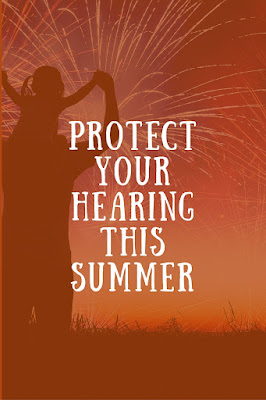
The link between noise and hearing loss:
Sound travels down the ear canal in waves. Loud noises can cause waves so forceful that they dislodge the tiny bones in the middle ear. If the waves pass through the middle ear and reach the inner ear, they can damage the tiny hair cells that carry sound all the way to the brain, where the sounds are interpreted. Unfortunately, once destroyed, these hair cells can’t repair themselves, and can no longer pass sounds along to the brain--resulting in permanent damage.
Noise levels are measured in decibels. Any sound over 85 decibels can result in hearing loss. For example, a passing motorcycle is roughly 90 decibels, and a firework exploding at close range is around 150 decibels. Noise-induced hearing loss (NIHL) can result from how loud the noise is, as well as the length of a person’s exposure to noise.
Noise-induced hearing loss can affect anyone, at any age. Children have a lower threshold for noise than adults, so it is even more important to protect their hearing during summer activities like watching fireworks or attending a festival with loud music.
Types of hearing loss due to noise exposure:
There are three types of hearing loss that may result from noise exposure.
- Tinnitus: a temporary ringing or buzzing in the ears after exposure. Tinnitus sometimes, but not always, goes away by itself.
- Temporary changes in threshold: A small decrease in hearing that disappears, usually approximately 24-48 hours after the exposure occurs. Although the hearing distortion goes away, evidence suggests there may be long-term hearing damage.
- Permanent hearing damage: Unfortunately, the most severe noise damage can result in irreversible hearing loss, often from a ruptured eardrum or trauma to the delicate bones of the middle ear.
Tips to protect hearing:
- Stand as far away as possible from the source of the noise. For example, the further away you stand from exploding fireworks, the less trauma to the ears.
- If standing far away isn’t practical, or if the noise is loud even from afar, use earplugs or noise-cancelling headphones to muffle the sound.
- Shorten the length of time exposed to loud noise.
- Keep children away from loud noise caused by lawn mowers, fireworks, firearms, lawn and farm machinery, stereo speakers, and concerts.
If you or a loved one has experienced hearing loss after noise exposure, it is a good idea to schedule a hearing test with a qualified audiologist. The audiologist will help determine if the change in hearing is temporary or permanent.
At Better Hearing Systems of Northwest Louisiana, we offer comprehensive hearing tests for adults and school-aged children, as well as video otoscopy for detailed viewing of the ear canal. Visit our website to learn more, or call (318) 309-4727 to schedule your free hearing consultation.
